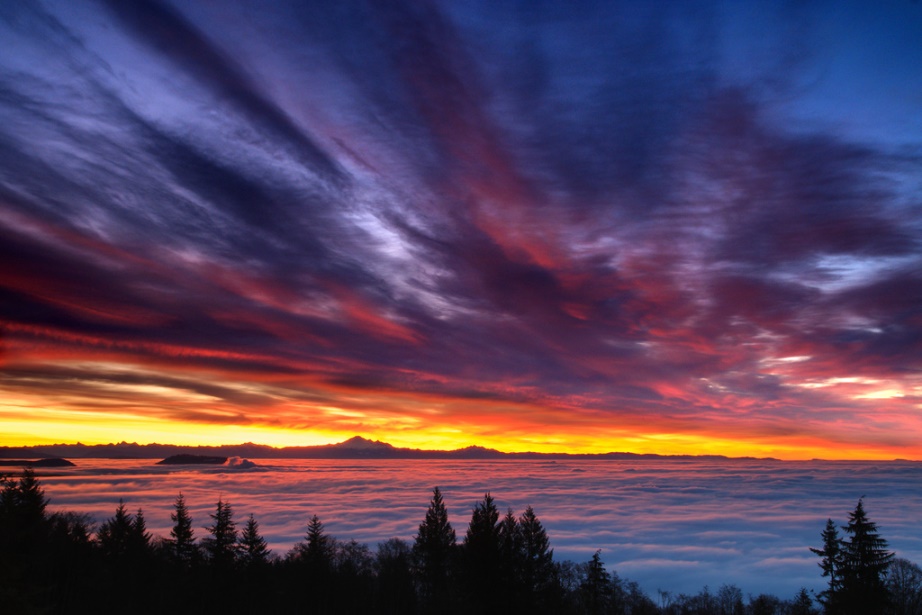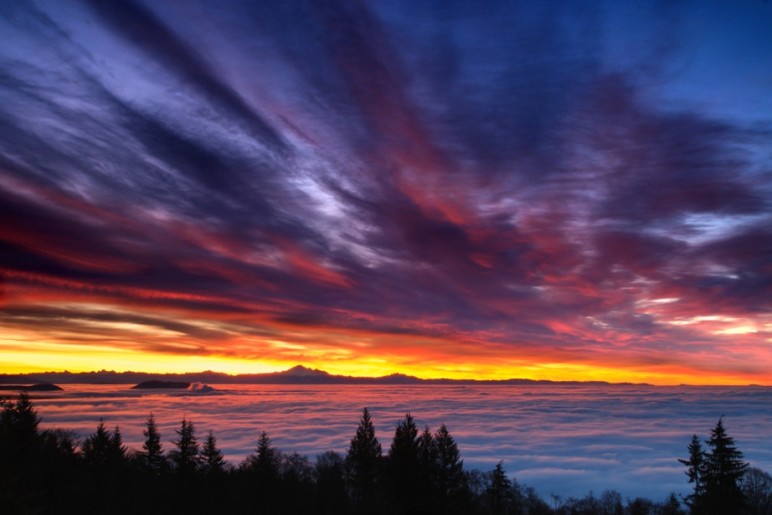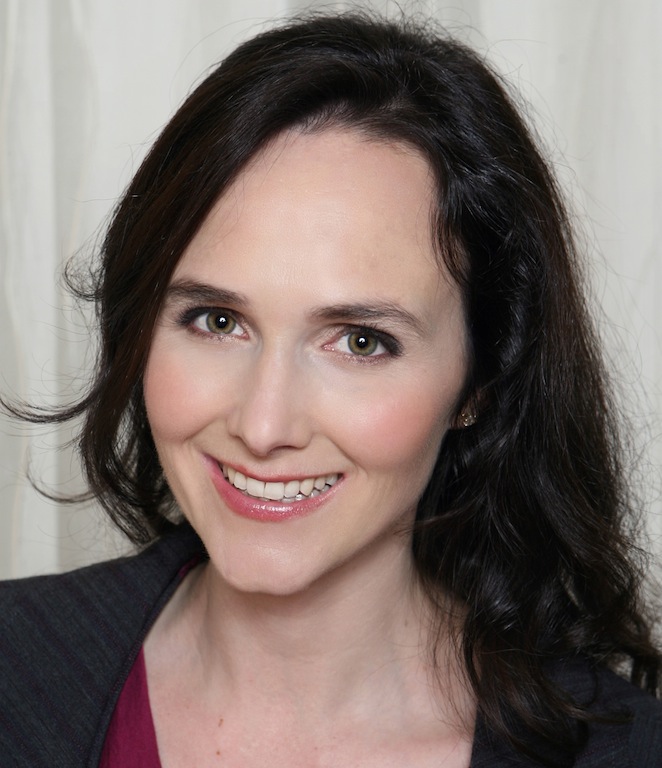Cascadia is a North American battleground for climate policy.
One-hundred-ninety-five nations reached an agreement in Paris this month. Interestingly, the landmark international accord draws a big fat highlight (and maybe a circle and some stars in the margin) across the work that activists and leaders are doing in the Pacific Northwest: not just the work to keep fossil fuels in the ground and make polluters pay for their pollution, but also our work to reduce the influence of money in politics and reform broken North American democratic institutions. Here are the factors that shaped the Paris Accord and what they mean for Cascadia.
America’s broken democratic institutions hampered the Paris negotiations.
Getting 195 nations to agree to limit pollution is an exercise in herding cats, but there was one particularly unruly feline in the bunch: the American Republican Party.
The GOP is the only major political party in any advanced industrial democracy that denies climate science. In other countries, conservative politicians may disagree with their liberal counterparts about what to do, but they acknowledge climate change as a mega-problem. They offer policy proposals, and they discuss solutions. In the United States, elected Republicans insist global warming is a hoax and call climate scientists “flat-Earthers.”
In 2015, some Republican presidential candidates have admitted that global warming is happening but still insist the United States should take no action. Note the gap between rank and file Republicans and the Republican politicians who are supposed to represent them: a majority of Republican voters believe there is “solid evidence of global warming.” Conservative thought leaders who are not in political office have offered up solutions. But three powerful forces prevent Republican politicians from doing the right thing.
The Money Problem
First, American elections are soaked in money. To win a US Senate seat, a candidate needs to raise about $10 million dollars. From whom can one raise millions of dollars these days? Why, from ideologically driven Super PACs flooded with money from financially interested industries such as oil and gas, of course! Big donors, not regular Republicans, control the Republican Party’s agenda on climate. For evidence that US Congress members are more responsive to the interests of Big Oil than to the citizens who elect them, one need look no further than Congress’s recent decision to lift the 40-year ban on oil exports, despite the fact that 69 percent of Americans across both parties support the ban.
The (Mis)Representation Problem
Second, the United States’ archaic voting system guarantees that members of Congress do not proportionally represent voters. Even when 52 percent of voters want a Democratic House, antiquated winner-take-all voting in single-winner districts leads to Republicans holding 57 percent of seats.
Want more? Cascadian leaders talk about the Paris climate talks here.
The Extremist Problem
Third, gerrymandering empowers extremists. Nearly two-thirds of Congressional districts are “safe” for one party, meaning the party primary is the real race because one party is all but guaranteed to win the general election. Because few voters turn out for primaries, a tiny number of voters supporting a radical candidate in a “safe” district can end-run around general voters’ preferences.
Single-winner districts enable gerrymandering; gerrymandering creates safe districts; safe districts empowered the Tea Party to grab the wheel of the whole Republican Party and take a sharp right turn. (Tea Party challengers won enough Republican primaries in 2010 that “mainstream” conservative candidates took radically conservative positions in 2014 to keep their seats.) The Paris accord was nonbinding because a binding treaty never would have won the necessary two-thirds approval in the Republican-controlled US Senate.
In other words: a handful of American outliers, under the influence of oil money, kept the world from bigger and better advances towards solutions.
The Paris accord relies on transparency, not binding mandates.
That’s right; because the colossal influence of money and gerrymandering in American politics put a small tribe of science-deniers in a position of outsized global power, the accord is nonbinding. That means that nations set their own emissions goals and decide how (or whether) to enforce them. However, the accord does require nations to monitor, verify, and report their greenhouse gas emissions using uniform international reporting methods. The upside: mandatory emissions reports will let activists keep an eye on their countries’ emissions and let nations keep an eye on each other.
The accord puts public pressure and peer pressure front and center.
Accountability for meeting pollution-reduction targets falls mostly to the public—to civil society. Activists, the media, and the whole messy, euphoric, furious, social media-amplified voice of a mobilized global movement are now essentially the enforcement mechanism for an international agreement on the planetary threat of the century.
Paradoxically, the accord also relies on nations’ desire to “keep up with the Joneses.” Humankind’s obsession with appearances has spawned McMansions and Cadillacs. Now the global community is using that competitive instinct as a tool for curbing pollution. This round was not intensively competitive; nations’ Paris commitments put the world on a path towards 3.5 degrees Celsius (6.3 degrees Fahrenheit) warming. Not good.
But the Joneses are just getting started. Nations must revisit their pollution reduction pledges every five years. These regular assessments, or “stocktakes,” give activists the stage on which to shame their own governments into doing better. They also afford governments the opportunity to one-up each other. Every bit of leverage and airtime that activists get in the next five years could lead to a stronger round of commitments.
Cascadia is more important than ever.
Curiously, all of these factors make Cascadia more important than ever. The Pacific Northwest is a laboratory of democracy reform trying to reduce the influence of Big Money, universalize voter registration, and modernize voting systems.
Cascadia is a North American battleground for climate policy. Oregon and Washington could both soon put a price on carbon pollution and create a West Coast block from British Columbia to California (in partnership with Quebec, Alberta, and nine Northeast states). Everything we do here to abandon carbon and embrace clean energy makes it easier for Canada and the United States to raise their ambitions at the next UN stocktake.
Everything we do here shows the rest of North America and the world just how prosperous and enviable a clean-energy future can be. Everything we do here sets an example.
And here, this particular place on Earth, is the place where communities are drawing a Thin Green Line…
The Thin Green Line is more important than ever.
By saying aloud that the world must end combustion of carbon-based energy, Paris essentially ratifies Cascadia’s Thin Green Line, which is, at base, a line of resistance. The Thin Green Line is the coast-long mobilization of fiercely motivated and politically powerful resistance to would-be dirty-fuel exporters. As communities in our region stand up to Big Oil and Coal export projects, we are rejecting the status quo and keeping the fossil fuels in the ground.
Some of the biggest fossil fuel deposits in North America lie to our East: Powder River Basin coal, Bakken shale oil, and Alberta Tar Sands. The fastest growing energy markets in the world lie to our West, in Asia. And the only profitable trade route between them traverses land and waters over which we have control. Cascadia is gaining a reputation in the old-line energy industry as the place where their projects come to die. Cascadians are on the frontlines of revoking fossil fuels’ social license, of rejecting and repudiating a too-powerful industry.
Paris amplifies the Thin Green Line’s collective “No!” to climate disruption; no to coal, no to oil, no to fracked gas.
See also: Northwest communities are stopping coal and oil in their tracks.
Coal’s demise and clean power’s insurgence are inevitable.
Oil and coal companies may continue plugging their ears and yelling “LALALA!!!” until the bitter end, but the bitter end is looming, at least for some of them. Coal companies are going belly-up. Paris stamps approval on the idea of a carbon bubble: that fossil-fuel companies carry massively inflated stock values, because most of their reserves of fuel will never be burned (that’s what the accord’s aspirational goal of 1.5 degrees C means). Smart investors are already getting out before it pops; they’re betting on non-carbon businesses.
The Paris accord points us in the right direction. Now it is up to us to race there, together. The starting gun has sounded, and it’s our turn to run.
Cascadia can show the world how to say “Yes!” to clean energy; yes to dense, beautiful, and affordable communities; yes to safer streets for everyone from children to the elderly; yes to a walkable, bikable, transit-rich transportation system; yes to electric vehicles, internet-speed ride sharing, and the smart grid ; yes to wind, solar, and ultra-efficiency; yes to innovation and science and solutions we haven’t even imagined yet; yes to restored, carbon-absorbing grasslands, to oceans no longer endangered by acidification, and to towering Northwest forests regrown to once again capture vast quantities of carbon.
Yes to our kids and grandkids’ health, prosperity, and well-being in this place we love. Now is the time. Cascadia is the place.
Want to know more? Here’s Sightline’s Paris Reading List:
- Justin Gillis, Climate Accord Is a Healing Step, if Not a Cure, New York Times
- Lenore Taylor, Paris climate deal might just be enough to start turning the tide on global warming, The Guardian
- Bill McKibben, Falling Short on Climate in Paris, New York Times
- David Roberts, The conceptual breakthrough behind the Paris climate treaty, Vox
- Coral Davenport, Nations Approve Landmark Climate Accord in Paris, New York Times












David Kershner
Thank you, Kristin and Alan, for helping us connect the dots between needed campaign finance reforms, voting reforms, and climate protection.
Hal Darst
Great article! Actually inspiring – something I rarely feel these days. Thanks for the good work you guys do!
Morganb
Agreed–a great article in the classic Sightline style of connecting the dots. I appreciate deeply Sighline’s recent forays into political mechanics. Still, I think that the second half of this article points to a profound power that we enviros in the NW have by building a sustainability narrative that can be applied elsewhere. For certain, all these pieces work together, but demonstrating the viability of a deep and broad sustainability success is something not currently available to most communities.
Again, thanks for the great article
Shaun
Thank you for acknowledging how gerrymandered redistricting and constitutional amendments (such as eliminating “one county-one senator” representation) favor extremism from the major population centers of Oregon. You must take comfort in the security of your bigoted, paternalistic-feudal system that keeps us heathen mountain folk in our proper place.